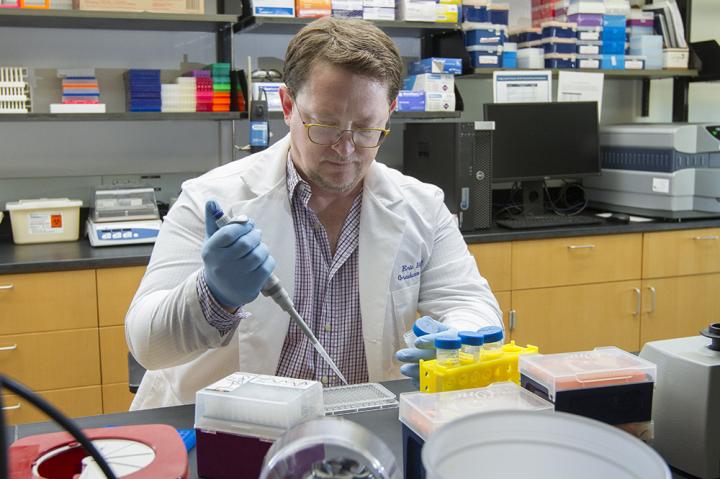Researchers at the Medical University of South Carolina and elsewhere discover the therapeutic potential for a class of lipids to prevent progressive memory loss in a preclinical model of Down syndrome

Credit: Sarah Pack, Medical University of South Carolina
Individuals with Down syndrome are at a much greater risk of developing Alzheimer’s disease, with inflammation of the brain starting early in life and the risk of Alzheimer’s reaching nearly 80% by the age of 60.
The root cause of Alzheimer’s disease is unknown. However, its frequency in patients with Down syndrome suggests that targeting inflammation in preclinical models of that syndrome could be an attractive strategy for designing therapies to promote healthier aging.
In one such preclinical model of Down syndrome, administering specialized lipids, known as resolvins, reduced inflammation and prevented memory loss, according to a recent article in Glia.
The findings were reported by researchers at the Medical University of South Carolina (MUSC), the Center for Alzheimer’s Research at the Karolinska Institute in Sweden and the Knoebel Institute for Healthy Aging at the University of Denver.
“We have an ancient pathway that helps us return our damaged bodies to normal, which is known as the resolution response,” said lead author Eric D. Hamlett, Ph.D., assistant professor in the Department of Pathology and Laboratory Medicine at MUSC. “In our model, we can now engage this response with the specialized lipids and, in a more natural way, calm down long-term inflammation.”
While the Down syndrome model does not produce the same brain ‘tangles’ that normally would be observed with Alzheimer’s disease, constant brain inflammation begins early in life and leads to similar neuronal damage. In humans, long-term inflammation is often seen alongside other indicators of Alzheimer’s in the brain, but it is not yet known how these conditions get started.
Chronic brain inflammation typically leads to progressive memory loss. Surprisingly, a sustained treatment regime with the lipid reversed memory loss in the Down syndrome model without having any adverse effects, reinforcing its role as a potential therapeutic.
The tragic progression of memory loss and dementia due to Alzheimer’s represents a breakdown of the brain’s ability to self-maintain and to limit wild fluctuations in condition. However, self-maintenance can be disrupted by injuries, pathogens and sometimes by aging.
The disruption of self-maintenance can manifest as prolonged inflammation, which can result in devastating effects if left unchecked. Down syndrome is one such condition that can result in this sustained inflammation response.
Typically, the inflammation caused by a disease is resolved by the body naturally. However, when the body cannot do so, long-term inflammation can result. With the body on high-alert but unable to rectify the problem, progressive damage can occur as our normal tissues are caught in the crossfire.
“Our bodies first need to be able to respond to a problem and then have a separate and equally important response to resolve the inflammation mechanism,” explained Hamlett.
Gaining insights into the role of inflammation in a healthy brain could bring us closer to identifying key mechanisms in our body that are activated in response to damage and age. Understanding how these mechanisms are activated could allow us to control the balances our bodies must achieve every day, leading to breakthroughs in regenerative medicine and potential new therapies that halt the progression of dementia.
Brevity of inflammation is crucial to healthy healing, and using these naturally produced lipids may be the first step in understanding our body’s most ancient system of recovery.
###
Disclaimer: The content is solely the responsibility of the authors and does not necessarily represent the official views of the National Institutes of Health.
About the Medical University of South Carolina
Founded in 1824 in Charleston, the Medical University of South Carolina (MUSC) is the oldest medical school in the South, as well as the state’s only integrated, academic health sciences center with a unique charge to serve the state through education, research and patient care. Each year, MUSC educates and trains more than 3,000 students and 700 residents in six colleges: Dental Medicine, Graduate Studies, Health Professions, Medicine, Nursing and Pharmacy. The state’s leader in obtaining biomedical research funds, in fiscal year 2018, MUSC set a new high, bringing in more than $276.5 million. For information on academic programs, visit http://musc.
As the clinical health system of the Medical University of South Carolina, MUSC Health is dedicated to delivering the highest quality patient care available, while training generations of competent, compassionate health care providers to serve the people of South Carolina and beyond. Comprising some 1,600 beds, more than 100 outreach sites, the MUSC College of Medicine, the physicians’ practice plan, and nearly 275 telehealth locations, MUSC Health owns and operates eight hospitals situated in Charleston, Chester, Florence, Lancaster and Marion counties. In 2019, for the fifth consecutive year, U.S. News & World Report named MUSC Health the number one hospital in South Carolina. To learn more about clinical patient services, visit http://muschealth.
MUSC and its affiliates have collective annual budgets of $3 billion. The more than 17,000 MUSC team members include world-class faculty, physicians, specialty providers and scientists who deliver groundbreaking education, research, technology and patient care.
Media Contact
Heather Woolwine
[email protected]
843-792-7669
Related Journal Article
http://dx.




